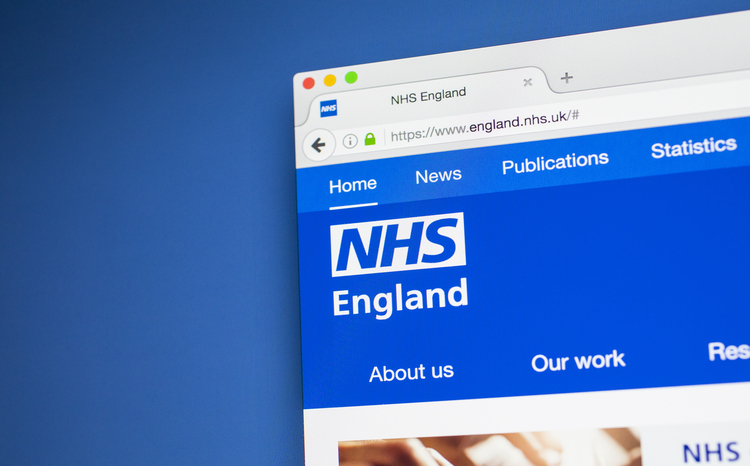Industry news in brief
- 15 October 2021

The latest Digital Health News industry round up includes the launch of an NHS innovation fellowship, a partnership to deliver password-free access to apps, and an award win.
Huma and Bayer collaborate on machine learning project
Healthtech company Huma has collaborated with life sciences company Bayer to advance precision treatment for lung cancer through machine learning.
The two companies will use machine learning to improve diagnosis through more precise readings of computed tomography (CT) scans. By distinguishing between different forms of non-small cell lung carcinomas with CT scans they hope to enable specialists to rapidly diagnose patients with the correct form of cancer and ensure appropriate and timely treatment.
Usually patients are required to undergo a series of tests to characterise their cancer which can be invasive and time consuming. The use of machine learning to categorise and segment patient subtypes is now being explored by Huma and Bayer.
They intend to use machine learning to spot correlations in molecular and imaging assessments that could differentiate types of lung cancer. As part of the research project the team will then create, train and test models that can accurately diagnose the correct form of lung cancer.
Dan Vahdat, CEO and founder of Huma, said: “We have shown we can use machine learning to predict an individual’s risk of depression, anxiety, cardiac events and the impact of being infected by Covid-19, and we hope this works in cancer will be a new field for us.
“We want to start by providing more personalised care for people with non-small cell lung cancer. In the future, our vision is to include other cancers and even other therapeutic areas such as rare diseases.”
Robert LaCaze, head of oncology, pharmaceuticals division, Bayer, said: “Rather than treating all lung cancer patients with standardised regimens, precision medicine can allow physicians to prescribe medicines tailored to the tumour’s specific oncogenic driver.
“Our collaboration leverages Huma’s proven expertise in machine learning and Bayer’s vast capabilities in oncology and medical imaging to help accelerate the identification of those patients with certain types of non-small cell lung cancer who can most benefit from these tailored treatments.”
UCLPartners Innovation Fellowship launched
UCLPartners is looking for NHS innovators who have developed health solutions with a technology element for its inaugural Innovation Fellowship.
The 12-month Innovation Fellowship, which starts February 2022, will provide six Fellows from London and the Essex region with support to scale up their health innovations. The tailored support is designed to take innovations at proof-of-concept stage forwards, and include key business areas such as value proposition, evidence generation, information governance and health economics. NHS relationship brokering will also be provided.
Suzanna Ali-Hassan, deputy director of commercial and innovation at UCLPartners, said: “NHS staff are well-equipped to identify health challenges facing the sector and we are increasingly seeing digital solutions to meet these demands coming from within.
“We want to work with NHS innovators in our region, who have developed digital products or services, to get them to their next stage of growth. I am very excited to announce the launch of our first UCLPartners Innovation Fellowship that combines our extensive knowledge and expertise into a programme to help improve health outcomes for patients, staff and the NHS.”
NHS clinical and non-clinical staff who are working in North East London, North Central London or Mid and South Essex Integrated Care Systems are invited to apply before November 14 if they have developed an innovation that tackles a NHS health challenge and has a technology element. Find more information about the Fellowship.
PAMAN telehealth service wins innovation award
Greater Manchester-based digital health company PAMAN has won the Innovation Award in this year’s Excellence in Supply Awards for its remote medicines management service.
Developed by The Medication Support Company, PAMAN believes itself to be the world’s first remote medicines management service. According to the company it can boost the number of people taking their prescriptions correctly from 55% up to 97%.
The service is available for people who need extra support in taking their prescribed medicines. A Medihub videophone is installed in these people’s homes, pharmacists are then able to call directly and talk to the patient, watch them take their medicines or administer treatments, offering advice when necessary. Simple to use, the patient only needs to press a button on the top of the Medihub to connect the call.
The NHS in the North Excellence in Supply Awards is hosted by the Innovation Agency.
Richard Deed, associate commercial director of industry at Health Innovation Manchester, one of the awards’ sponsors, said: “Congratulations to The Medication Support Company on winning this year’s Excellence in Supply Innovation Award. This innovative work being done out of Manchester is making a real difference to the delivery of care across the North West.”
Imprivata and VMWare partner up to unlock passwords
Imprivata, the digital identity company, and VMWare have joined forces to enable clinicians more secure, password-free access to any app on their mobile device.
The initiative will bring a smoother workflow by empowering clinicians to unlock apps via a single tap of a badge. It will also boost security by making it easier to select more complex passwords, without the need to remember them.
Imprivata GroundControl, Imprivata OneSign and VMWare Workspace ONE will integrate to free clinicians from the need to type passwords into mobile devices.
Last month Imprivata introduced its Enterprise Password AutoFill capability which removed the need for manual authentication while maintaining security. Now the collaboration with VMWare will enhance its value.
Imprivata’s solutions will be integrated with VMWare’s Workspace ONE to broaden access to nearly every mobile app, including healthcare-specific ones. Regardless of the authentication method, clinicians will be able to access their apps without passwords. A clinician’s badge tap – or other authentication of digital identity – is federated to any application being managed by Workspace ONE.
Gus Malezis, CEO of Imprivata, said: “Today’s hyper-demanding healthcare environment requires clinicians to input lengthy usernames and complex passwords every time they want to access an application, easily burning up to 45 minutes or more of valuable time per shift and distracting from their most critical focus: patient care delivery.
“Now, security and compliance comes in concert and without compromises to productivity. Our deeper collaboration with VMWare enables auto-typed passwords and password-less workflows that allow for enhanced password complexity while dramatically improving workflows.”
Mike Lonze, director of healthcare alliance engineering at VMWare, added: “Together, Imprivata and VMWare give clinicians more secure, easy access to the real-time health information and medical data needed to improve patient care and clinician productivity. This new integration represents a huge step in providing our customers with frictionless mobile device access while ensuring security remains intact.”
HCL and Google Cloud launch healthcare and life sciences solutions
A partnership between HCL Technologies and Google Cloud is supporting the digital transformation of healthcare and life sciences with a new centre of excellence.
The centre of excellence (CoE) will focus on the industry’s digital shift and will work with industry experts to deliver new solutions for HCL’s payer, provider, medtech and biopharma customers. The solutions will then be accelerated and brought to market by HCL’s Google Cloud Native Labs, capitalising on its native data, AI and security expertise in cloud-native solutions.
Joe Miles, managing director of cloud healthcare and life sciences Google Cloud, said: “We’re excited to see our partnership with HCL grow within the healthcare and life sciences industry as we continue to build solutions that will help organisations digitally transform the processes and experiences of their customers, physicians and patients.
“Customers can leverage HCL’s strong healthcare and life sciences industry expertise and their investments in the center of excellence for Google Cloud to support their growth and innovation objectives.”
The solutions it develops will address critical industry issues, such as interoperability, data governance and security.
Shrikanth Shetty, corporate vice president and global head of HCL Google ecosystem, HCL Technologies, said: “We partnered with Google Cloud for this key initiative because it will enable our experts at HCL to incorporate decades of domain expertise to deliver cutting-edge, cloud-native solutions to the market. The partnership will help improve the patient and employee experiences and use data to drive insights in areas like claims management and servitisation.”





